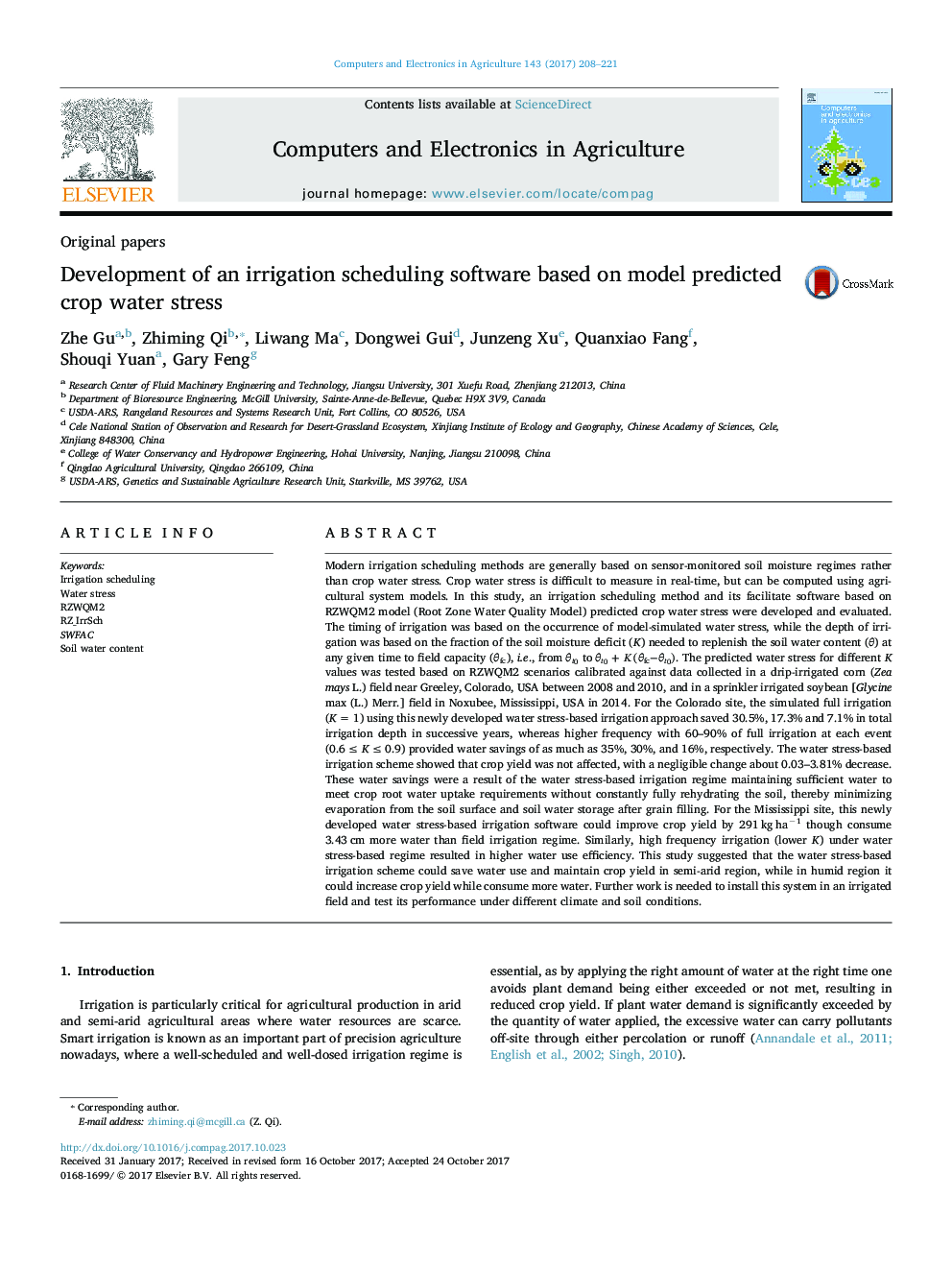| کد مقاله | کد نشریه | سال انتشار | مقاله انگلیسی | نسخه تمام متن |
|---|---|---|---|---|
| 6539971 | 1421105 | 2017 | 14 صفحه PDF | دانلود رایگان |
عنوان انگلیسی مقاله ISI
Development of an irrigation scheduling software based on model predicted crop water stress
ترجمه فارسی عنوان
توسعه نرم افزار برنامه ریزی آبیاری بر اساس مدل پیش بینی تنش آبی محصول
دانلود مقاله + سفارش ترجمه
دانلود مقاله ISI انگلیسی
رایگان برای ایرانیان
کلمات کلیدی
موضوعات مرتبط
مهندسی و علوم پایه
مهندسی کامپیوتر
نرم افزارهای علوم کامپیوتر
چکیده انگلیسی
Modern irrigation scheduling methods are generally based on sensor-monitored soil moisture regimes rather than crop water stress. Crop water stress is difficult to measure in real-time, but can be computed using agricultural system models. In this study, an irrigation scheduling method and its facilitate software based on RZWQM2 model (Root Zone Water Quality Model) predicted crop water stress were developed and evaluated. The timing of irrigation was based on the occurrence of model-simulated water stress, while the depth of irrigation was based on the fraction of the soil moisture deficit (K) needed to replenish the soil water content (θ) at any given time to field capacity (θfc), i.e., from θt0 to θt0+K(θfc-θt0). The predicted water stress for different K values was tested based on RZWQM2 scenarios calibrated against data collected in a drip-irrigated corn (Zea mays L.) field near Greeley, Colorado, USA between 2008 and 2010, and in a sprinkler irrigated soybean [Glycine max (L.) Merr.] field in Noxubee, Mississippi, USA in 2014. For the Colorado site, the simulated full irrigation (Kâ¯= 1) using this newly developed water stress-based irrigation approach saved 30.5%, 17.3% and 7.1% in total irrigation depth in successive years, whereas higher frequency with 60-90% of full irrigation at each event (0.6â¯â¤â¯Kâ¯â¤â¯0.9) provided water savings of as much as 35%, 30%, and 16%, respectively. The water stress-based irrigation scheme showed that crop yield was not affected, with a negligible change about 0.03-3.81% decrease. These water savings were a result of the water stress-based irrigation regime maintaining sufficient water to meet crop root water uptake requirements without constantly fully rehydrating the soil, thereby minimizing evaporation from the soil surface and soil water storage after grain filling. For the Mississippi site, this newly developed water stress-based irrigation software could improve crop yield by 291â¯kgâ¯haâ1 though consume 3.43â¯cm more water than field irrigation regime. Similarly, high frequency irrigation (lower K) under water stress-based regime resulted in higher water use efficiency. This study suggested that the water stress-based irrigation scheme could save water use and maintain crop yield in semi-arid region, while in humid region it could increase crop yield while consume more water. Further work is needed to install this system in an irrigated field and test its performance under different climate and soil conditions.
ناشر
Database: Elsevier - ScienceDirect (ساینس دایرکت)
Journal: Computers and Electronics in Agriculture - Volume 143, December 2017, Pages 208-221
Journal: Computers and Electronics in Agriculture - Volume 143, December 2017, Pages 208-221
نویسندگان
Zhe Gu, Zhiming Qi, Liwang Ma, Dongwei Gui, Junzeng Xu, Quanxiao Fang, Shouqi Yuan, Gary Feng,
